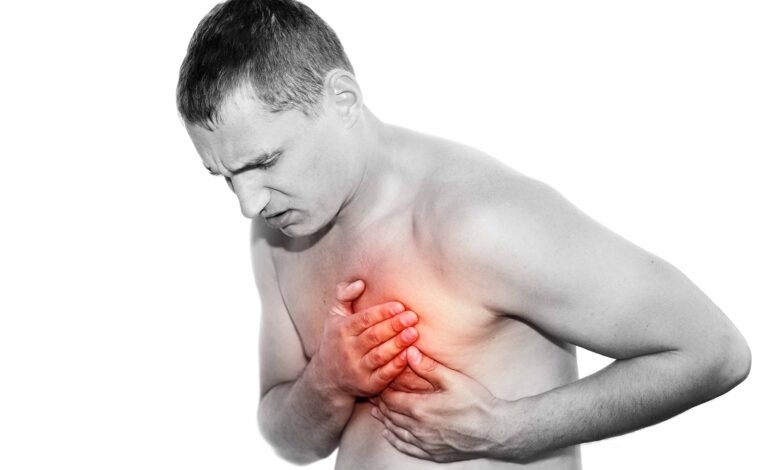Atrial fibrillation

What is atrial fibrillation?
Atrial fibrillation is an irregular and often rapid heartbeat. An irregular heartbeat, or arrhythmia, is the result of irregular electrical impulses from the “natural pacemaker”.
It normally controls the coordinated contraction of the four heart chambers.
But when the impulses are uneven, this causes the chaotic contraction of the heart’s atria and chambers.
Some people, especially those taking medication, may have atrial fibrillation constantly, but still have their heart beating at less than 100 beats per minute.
Atrial fibrillation can be paroxysmal – the arrhythmia appears and disappears suddenly, persistent – the duration of the irregular rhythm is more than 1 week, and constant.
What are the symptoms?
Although most people do not develop obvious symptoms, if they do, they can vary greatly by individual.
Here are some of the most common symptoms and potential effects of atrial fibrillation:
-
Irregular pulsations and rapid heartbeat: This is one of the main symptoms that people can feel. Their heartbeat becomes faster, irregular, and sometimes misses or extra beats are felt.
-
Feeling tired and weak: Some people with atrial fibrillation may experience a general feeling of weakness and fatigue, which may be due to reduced blood circulation and insufficient delivery of oxygen and nutrients to organs and tissues.
-
Lack of energy: Due to the irregular heartbeat and reduced circulatory function, people with atrial fibrillation may experience a significant lack of energy and fatigue.
-
Chest pain: Cardiac discomfort, including pain, tightness, or pressure in the chest, may be associated with atrial fibrillation. However, it is important to distinguish between these symptoms and a heart attack, which is a medical emergency.
-
Shortness of breath: People with atrial fibrillation may experience shortness of breath or shortness of breath, especially when exercising or even at rest.
-
Tumps and headaches: Some patients may complain of heart palpitations or headaches, which may be the result of impaired blood circulation.
-
Stopping heartbeats (syncope): In rare cases, atrial fibrillation can lead to serious symptoms such as the heart stopping. This can lead to a short-term loss of consciousness – syncope.
-
Anxiety: The experience of a rapid and irregular heartbeat can cause anxiety and stress in patients. These emotional factors can exacerbate symptoms.
It is important to note that atrial fibrillation is a heterogeneous condition and symptoms can vary greatly between people.
If you experience any of the above symptoms or have doubts about the presence of atrial fibrillation, it is imperative that you consult your health care professional or cardiologist.
Early diagnosis and management of the condition is essential to maintaining heart health and general well-being.
What are the causes of atrial fibrillation?
Atrial fibrillation can also occur with other undiagnosed heart diseases. It sometimes occurs in young people who, even during examinations, do not find other diseases, but have atrial fibrillation.
Atrial fibrillation can also occur in the presence of other non-cardiac diseases and conditions such as:
- Bazed disease – hypofunction of the thyroid gland.
- Excessive use of alcohol
- Pulmonary embolism – blood clot in the lungs
- Pneumonia
Most often atrial fibrillation is due to heart diseases:
- Mitral insufficiency – blood backs up from the left ventricle back into the left atrium.
- Left ventricular hypertrophy – enlargement of the wall of the left ventricle. >
- Coronary or ischemic heart disease.
- Hypertension
- Myocarditis – inflammation of the heart muscle.
- In people over 40 years of age, the risk of fluttering increases.
Treatment of atrial fibrillation
Choosing the appropriate therapy depends on the cause of the disease, the patient’s general health and ability to tolerate certain medications, and whether he is taking any other medications. Certain medications can also cause an irregular heartbeat.
Anti-arrhythmic medicines such as amiodarone, sotalol, propafenone and flecainide. These drugs reduce the frequency and duration of atrial fibrillation. And they are effective in about 50 to 70% of fibrillation cases.
Beta-blockers slow down heart activity by reducing the size of the sinus node. And the heart’s need for oxygen decreases and blood pressure normalizes. Such drugs are, for example, esmolol, atenolol, propranolol, or metoprolol.
Calcium channel blockers are drugs that also slow the heart rate in a way similar to beta-blockers. Verapamil and diltiazem are calcium channel blockers.
Digoxin (lanoxin) – reduces the conduction of electrical impulses through the atrioventricular node, but its action is slower than that of beta-blockers and calcium blockers.
Digoxin is currently used primarily in people with cardiovascular disease associated with left ventricular dysfunction.
How to protect ourselves?
We need to minimize risk factors such as high blood pressure and risk factors for developing ischemic heart disease.
- We should not smoke or at least start to quit smoking.
- Our weight should be normal.
- The food we eat should be varied. It is recommended that there is not a lot of fat, it is even desirable that most foods are low-fat.
- Physical activity, and moderate, with an acceleration of the pulse and frequency of breathing – a minimum of 30 minutes 5 times a week .
- Regular monitoring of blood pressure and cholesterol.
- Moderate amounts of alcohol – about 50 grams per day is permissible.< /strong>
- Caffeine and energy drinks should be avoided.



